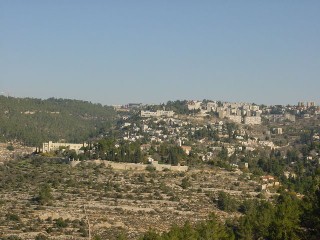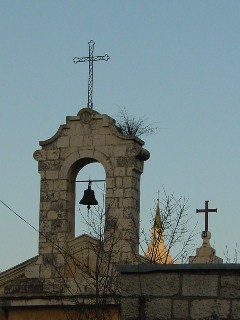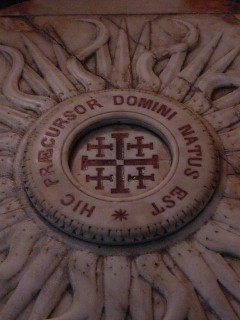 Ein Kerem
Ein Kerem|
|
|
|
Voices in the Wilderness
December 19, 2002
 Ein Kerem
Ein Kerem |
Once at Hadassah, we had a full day to kill, with one test early in the morning and the other late at night. We had brought papers to grade, books to read, and knitting to knit, so that was no problem. But we also wanted to explore a bit, so late that morning we made the half-hour walk from the hospital's perch down to the village of Ein Kerem.
The name means "generous spring" in Arabic, and until 1948, it was an
Arab village. Its story is like the stories of the hundreds of de-populated
towns in what is now Israel. In 1948, during the Israeli War of Independence/Palestinian
Catastrophe, most Palestinian civilians hoped to wait out the war.
Many of them changed their minds on April 9th, when Zionist paramilitary
fighters attacked the village of Deir Yassin. Official reports recorded
great cruelty: the killing of whole families, piles of bodies, parading
male villagers through streets of a nearby Jewish town before killing them,
and possible rape and subsequent murder of village girls. These reports
paled in comparison to how the story grew in gruesomeness in the Arab press
and spread among Palestinians like wildfire. The Deir Yassin Massacre
was a major factor in the mass exodus of two-thirds of a million Palestinians
from their homes, unknowingly destined to be refugees still, half a century
later. Vocally condemned by mainstream Zionist leaders, the cruelty
of Deir Yassin didn't repeat itself during the war. Arguably, it
didn't have to, as the goal of its perpetrators was largely achieved: cleansing
the land of its Palestinian population. At the time in Ein Kerem,
the men of the village kept vigilant watch. As Zionist forces approached
the village in the middle of one night, the alarm call was sounded and
nearly everyone fled, taking what they could. Most went to Beit Jala
initially, near Bethlehem, but are now scattered, like the rest of the
Palestinian diaspora, all over the world, denied the right to return to
their ancestral homes. One Arab family in Ein Kerem decided not to
flee. They, and people like them, are the "Arab Israelis," Palestinian
by ethnicity, Israeli by nationality. The rest of the town's homes
were classified as "abandoned" by the new Israeli government, and new immigrants
flooded into the properties.
 The village's former Greek Orthodox parish church
The village's former Greek Orthodox parish church |
It's not hard to imagine, in the mingled bloodline that makes up Palestinian
heritage, that among the ancestors of Ein Kerem's 1948 refugees were some
who knew young John. It seemed fitting to walk these streets during
the Advent season, because Ein Kerem's native son was, in the words imprinted
in the grotto at the Franciscan Church, the precursor of Christ.
He was preparing the way of the Lord. The picture in our minds of
this New Testament prophet is that of the Byzantine icons, the young man
with wild hair and rough clothes, eating strange foods and saying strange
things. His was that voice in the wilderness, that lone word of true
repentance facing a tide of Pharisaic self-righteousness. His charge to the people of God was one of self-reflection, of self-critique,
of self-awareness. His baptism was not a cleansing of the body -
anyone who has seen the Jordan River knows that - so much as a cleansing
of the heart. Our purity comes from our repentance, our welcome of
the Prince of Peace comes from removing the speck in our own eye.
 The birthplace of John the Baptist
The birthplace of John the Baptist |
Or perhaps that's just interfaith projection on our parts. We are weary of this world and its violence. And we are angry with our growing tribalism, our circling of the wagons against the world which is our enemy. There is a need, among Western nations and Eastern, among all of the religions of the world, to accept John's invitation to repentance. We need a chorus of Muslim voices crying that the intentional slaughter of civilians, in any and all circumstances, is evil. We need a chorus of Christian voices to silence the beating of the war drums, to stem the tide of pretense that war is only a game, that the only blood that is precious is Western blood. We need a chorus of Jewish voices who are willing to speak out against the country perpetrating racism, colonialism, and slaughter in their name. Maybe then, maybe, we can prepare ourselves for the coming of the Prince of Peace. Prepare the way of the Lord.
Salaam al-Masiih (the peace of Christ),
Elizabeth and Marthame
PS Elizabeth's medical tests turned out well, a clean bill of health! We have deeply appreciated your prayers and support this past month.